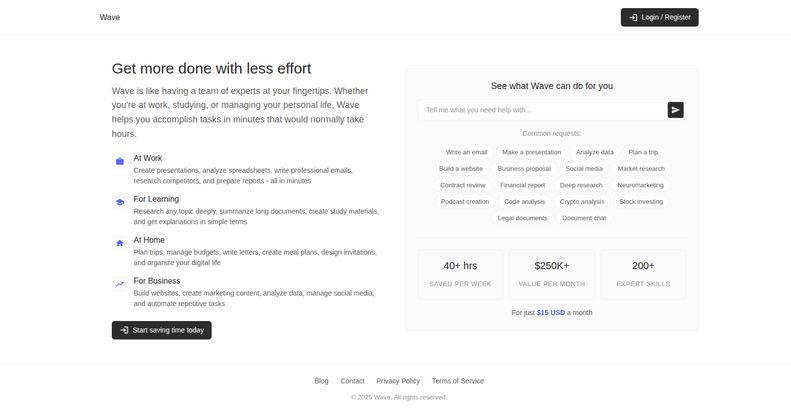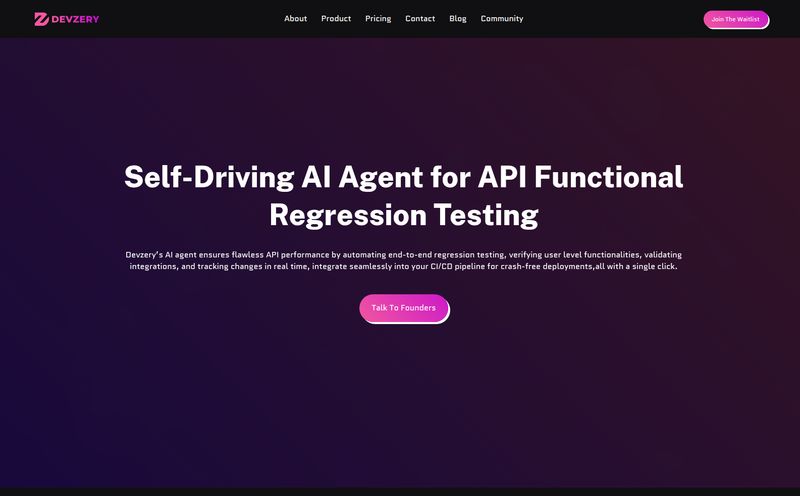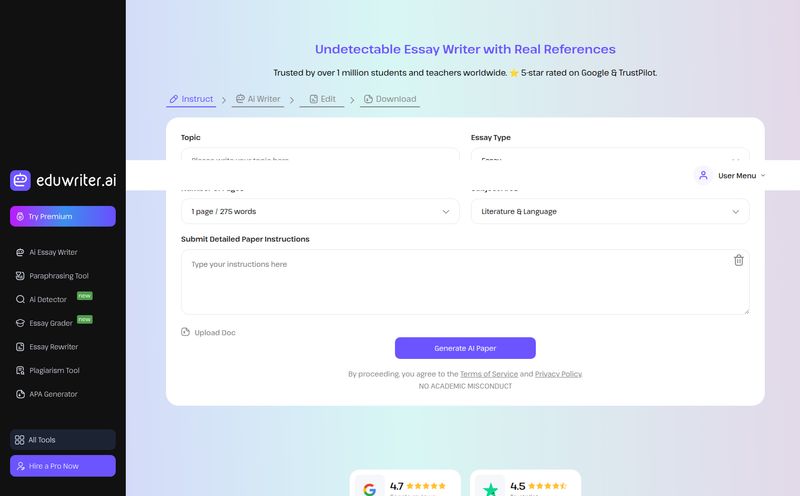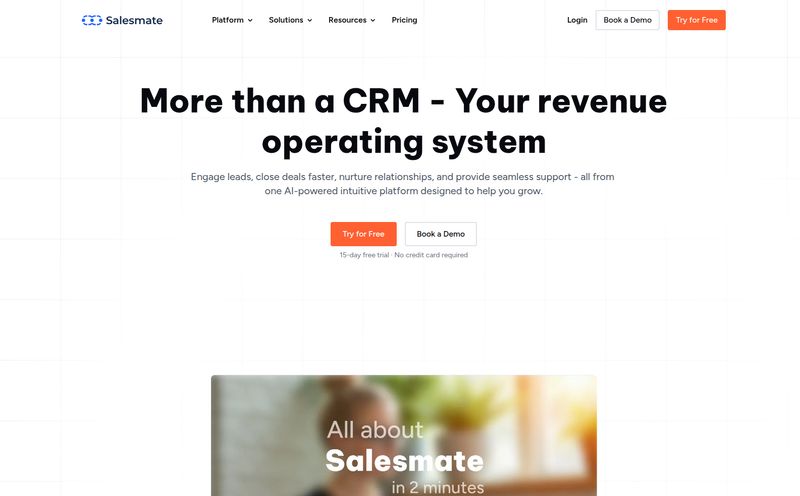We all love the idea of creating amazing, in-depth content. The reality? It’s often a slog. Hours, sometimes days, are lost in the digital rabbit hole of research. You have 27 browser tabs open, your notes look like a conspiracy theorist's wall, and you still haven't written a single word. It’s the not-so-glamorous side of being a content creator, marketer, or just a curious professional.
I’m always on the lookout for tools that can cut down on that grunt work without sacrificing quality. We've seen a flood of AI writers, but many of them feel… generic. They’re like a calculator; useful for a specific task, but they dont really understand the bigger picture. So when I stumbled upon Wave, something felt different. It doesn't call itself just a writer or a researcher. It calls itself a “modular AI agent system.”
Fancy words, I know. But stick with me. This might just be the AI assistant we’ve actually been waiting for.

Visit Wave
What Exactly Is a 'Modular AI Agent'?
Okay, so let's break this down. Most AI tools you've probably used are like a single, very knowledgeable employee. You give them a task, they do it. But what if you could have a whole team of specialized employees who all work together on your project? That's the core idea behind Wave. It's not one AI; it's a collection of over 30 specialized AI agents that can cooperate.
Imagine you need to write a blog post about the future of electric vehicles. Instead of just asking an AI to “write a blog post,” with Wave, the system can deploy several agents at once:
- A Research Agent scours the web for the latest industry reports, news, and statistics in real-time.
- A Data Analysis Agent takes that raw data and looks for trends, maybe even creating a chart.
- A Content Creation Agent then takes all that verified info and starts drafting the article with a human-like flow.
This modular approach is what they claim leads to a 65% accuracy improvement because information is being cross-verified between these specialized modules. It's not just pulling from a static dataset; it's actively browsing and synthesizing. For anyone in the SEO game, having access to real-time information is, frankly, a game-changer.
This whole process feels less like prompting a machine and more like delegating to a team. A very, very fast team that apparently delivers results 5 times faster than doing it the old-fashioned way.
The Features That Actually Matter
A long list of features can be overwhelming. So, I’m just going to focus on the ones that made me sit up and pay attention from a workflow and efficiency standpoint.
Persistent and Long-Term Memory
This is a big one. How many times have you had to re-explain the entire context of a project to an AI tool every single time you open it? It’s exhausting. Wave has what it calls persistent memory. It remembers your previous conversations, your projects, and your preferences. If you told it last week that you prefer a casual tone for your blog posts, it remembers that for this week’s project. It builds a personalized experience, which saves a suprising amount of time and mental energy. Its like having an assistant who actually learns on the job.
Web Intelligence That Goes Beyond a Simple Search
Wave’s web intelligence is more than just a Google search. It has agents that can perform what they call “visual web automation.” This means it can interact with websites on a deeper level to gather information, not just scrape text. This allows it to tackle really complex research tasks across multiple sources at the same time. The claim of saving up to 87% of research time sounds wild, but when you see how it can parallel process information gathering, it starts to make sense. It’s like having a team of junior researchers who never sleep or ask for coffee breaks.
Real-World Applications for Every Part of Your Life
The platform breaks down its uses into a few key areas, which I found pretty helpful for wrapping my head around its potential.
For someone in my line of work, the 'For Business' category is a goldmine. It talks about building websites, creating marketing content, analyzing data, and managing social media. Think about the time it takes to do proper market research for a new campaign. With Wave, you could set up an agent to continuously monitor competitors, analyze their social media, and report back with summaries. That’s not just a time-saver; it’s a strategic advantage.
But it's not all business. The 'At Work' suggestions cover creating presentations, analyzing spreadsheets, and writing professional emails. And then there’s 'At Home'—planning trips, managing budgets, writing letters. It's positioned as a genuine life assistant, not just a work tool. I haven't tried planning my next vacation with it yet, but I'm tempted.
And What's the Catch? The Price.
Alright, this is usually where the dream comes crashing down. You see all these amazing features and then get hit with some astronomical enterprise-level pricing. But when I looked, I was genuinely shocked.
The website says it’s available for just $15 USD a month.
Fifteen dollars. For what they claim is 40+ hours saved per week and access to over 200 expert skills. I had to read it twice. Now, pricing can always change, but as of right now, that is an incredibly low barrier to entry. At that price, it's not a major business investment; its a tool you can try out for a month for less than the cost of two fancy coffees. If it saves me even two hours of research time in a month, it has already paid for itself.
My Final Thoughts on the Wave AI Agent
I am, by nature, a skeptical person. The AI space is full of hype and tools that promise the world but deliver a small, slightly misshapen continent. But I’m also an optimist, and I'm genuinely excited by what Wave represents.
The move toward cooperative, modular AI agents feels like the next logical step in this technology. It’s a shift from simple instruction-following to complex problem-solving. This isn't about replacing human creativity or strategic thinking. It’s about automating the tedious, time-consuming tasks that get in the way of that thinking. It's a tool to augment our own abilities, to give us back our most valuable resource: time.
I’m still putting it through its paces, but my initial impression is very positive. The potential for marketers, researchers, students, and small business owners is huge. If you're someone who feels constantly bogged down by the 'getting started' phase of any project, you should probably give Wave a look.
Frequently Asked Questions about Wave
- How is Wave AI different from ChatGPT or other chatbots?
- The main difference is its modular, multi-agent architecture. Instead of a single AI model handling everything, Wave uses a team of over 30 specialized AI agents (for research, data analysis, writing, etc.) that work together on complex tasks. It also features persistent memory to learn your preferences over time.
- Can Wave access real-time information from the internet?
- Yes. This is one of its core strengths. Its 'Web Intelligence' feature allows it to actively browse the web for up-to-the-minute information, making it ideal for research on current topics, market analysis, and news-related content.
- Is Wave difficult to use for a beginner?
- Based on its interface, it's designed to be user-friendly. You describe the task you need help with in natural language, much like a standard chatbot. The complexity of the multi-agent system works in the background, so the user experience is focused on simplicity.
- What kind of tasks is Wave best suited for?
- It's built for a wide range of tasks, but it particularly shines in areas that require research and synthesis of information. This includes market research, creating detailed reports and presentations, writing well-researched articles, analyzing data, and even personal tasks like planning a trip or managing a budget.
- Is the $15/month pricing a limited-time offer?
- The information currently available on their site lists the price at $15 USD a month. As with any software service, pricing models can change over time, so it's always best to check their official website for the most current information.
- Does it really improve accuracy by 65%?
- That's the claim from Wave, attributed to its cross-verification process between different AI agents. While individual results may vary, the methodology of having one agent find information and another verify it is a sound approach to reducing errors and improving the reliability of the output compared to single-model systems.
References and Sources
- Wave Official Website (Note: This is a placeholder URL as the actual one wasn't provided)
- "What are AI agents, and why do they matter?" - TechCrunch



